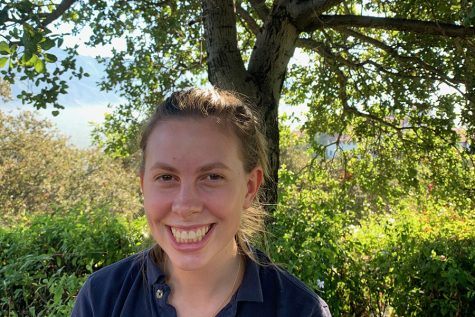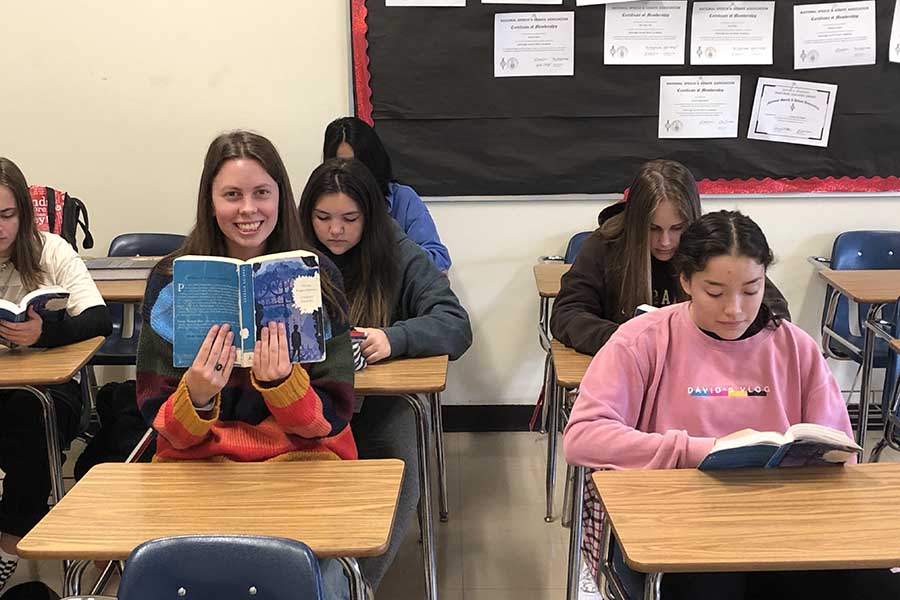‘Great Expectations’: The novel, the reality
Julia Yellen ’20 finds inspiration for her article by reliving the good old days of freshman English.
Does anyone else recognize that coming-of-age movie cliche where the protagonist’s current dilemma happens to correlate perfectly with the book she’s reading in English class?1
Say what you will, but I have always enjoyed playing into this trope in my daily life, relating my own petty dramas to the storylines of English class reading material. “The Bean Trees”? Who couldn’t relate to wanting to make an impulsive decision like moving across the country to escape reality and responsibility? “The Odyssey”? I personally related to Penelope’s gluttonous suitors, who take advantage of her hospitality for years and meet their demise at the end when Odysseus brutally slaughters them all: justice for unchecked selfishness. “The Great Gatsby”? Chasing forbidden love, pushing desperately to be on the inside, trying not to accept that you will never be good enough and putting up a front to seem attractive and invincible to those around you. “Brave New World”? Feeling different, knowing that you don’t belong and that you can’t relate to the people around you.2
But now that my high school career is coming to an end, it would break my heart if I didn’t fulfill that certain Hollywood cliche in writing. So let’s talk about the one book I’m pretty sure every single person in my class was supposed to read.3
Welcome to “Great Expectations,” the novel, the reality, the high school. Because who couldn’t relate to a chained convict accosting you while you visit your dead parents’ graves and then threatening to slit your throat unless you get him some wittles?4 You might be heavily questioning how this 425-page classic novel about an ungrateful English boy has anything to do with our high school experiences, but trust me, it does.
It’s been three years since I read this book in Ms. Hunnewell’s class, filling every inch of empty space with annotations about anaphora and my frustrations with Pip. I genuinely loved Dickens’ writing, and I pretentiously loved that I was one of the only ones who did in my class. Maybe it’s because it was the first time I read about someone else who didn’t shower,5 and I felt extremely touched to be represented in the literature I consumed.6 Or maybe it’s because I saw myself in Pip.
From the beginning of the novel, Pip remains completely dissatisfied with his lower-class reality. Funnily enough, even when Pip’s physically abusive sister/mother-figure beats him with her “Tickler” cane, reader sympathy doesn’t last long. Pip’s ambitions generate his bitter resentment for the only person that truly loves him, his brother-in-law, Joe, whom Pip associates with poverty. My peers and I remained appalled by Pip’s overwhelming ungratefulness, and we scoffed at his selfishness as he climbed the English social hierarchy.
We may not have recognized it then, but it seems that we’re all a little more like Pip than we’d like to admit.
It’s almost comical how much we take for granted our own family during our high school years, an unflattering symptom of our efforts to gain independence. We don’t appreciate our closest relationships, we have bloated and unrealistic expectations about the lives we do not have and we stubbornly convince ourselves that we are destined for more. No matter what we have or haven’t accomplished, we genuinely believe we deserve all the blessings we receive.7 We talk and talk and talk and talk and lie to ourselves about who we are in the great pursuit of becoming who we want to be. We yearn for the future, to finally live in our prime college years. But in the process of daydreaming, we forget to appreciate what we have right now. Like Pip, we fall in love with Estellas — or the idea of Estellas, I should say — who genuinely couldn’t care less about our existence.8
But high school is not all selfishness and teen angst. Pip grows. Pip changes. And so have we. The class of 2020 started as the grade that caused the 2018 vaping assembly and became the class that retrofitted the physics regatta to take place in sinks and bath tubs at home. I started as an overly excited yet sleep-deprived freshman who forced everyone she introduced herself to at the welcome dinner to follow her on Instagram, and I became a well-rested hedonist who cares more about watching TikTok than completing her Membean. High school is an assembly line of character development, and perhaps our all-girls Catholic, Dominican, independent, college-preparatory, day-and-boarding FSH environment has really tinkered with our narcissistic Pip minds in a lovely way.
So here we are. It’s the end. Of high school. Of this essay. Of adolescence?
You probably thought this piece was going to be a who’s who, literally relating the world of Dickens to some star figures at FSH. Down at the SAC, you will see our very own Joe Gargery, the lovely Nurse Kathy, whose unconditional love supports every Pip on the Hill. Trek to Juniorland, and you will see 102 Miss Havishams who are surviving APUSH but haven’t seen the light of day in weeks.9 Stroll through Senior Patio and you will see the seniors anxiously awaiting the next chapter in their lives, like Dickens’ loyal fans awaited the next installment in Pip’s story, left on a cliffhanger with no idea what will happen next.
Eh, I’m stopping this bit before it gets too cliche.
High school is “Great Expectations.” High school is idealized love. High school is destructive behavior. It’s dealing with overwhelming shame about your identity, personality and experiences. It’s the abandonment of past worldviews and the gestation of new values. It’s acceptance of the life and love we deserve. It’s anxiously anticipating the next episode. It’s the realization that you are a poser; it’s the confrontation of true circumstances; it’s the continuation of dreams.
…
[1] The staff at the Veritas Shield admits to recognizing this cliche even though none of us are able to think of an example outside of the movie “Easy A.”
[2] I guess all these books are about being an outsider and how romantic it is to believe that you are unpredictable, special and interesting, unlike your one-dimensional peers? If high school has taught me anything, it’s that I’m not all that.* But that’s beside the point.
*This is a footnote for my footnote. I originally cursed, but this newspaper is rated PG.**
**I know it’s rated PG because a footnote on a footnote on a footnote may not be suitable for all children.
[3] I intentionally excluded “Romeo and Juliet” from this piece because Shakespeare doesn’t need the clout.
[4] I had to reach into the bowels of my long-term memory to conjure up the word “wittles.” It means food.
[5] It truly astonishes me that I have to remind you all of one of the most recognizable figures in literature, but I am referring to Ms. Havisham, a rich old aristocrat who has not taken off her wedding dress in decades and sits in her own filth and decay all day.
[6] For context, I am publicly harassed by so-called friends for having poor hygiene because I choose to take showers every other day instead of daily to conserve resources.
[7] This darn generation! Always getting prizes for just participating. Bootstraps, people!*
*Sorry for sounding like your Republican grandfather.
[8] I myself am notoriously guilty of idealizing many nameless Estellas whom I barely know, bred straight out of the Degheri theater.
[9] Look at that! Another Ms. Havisham joke. Jerry Seinfeld actually picked me up to film an impromptu episode of “Comedians in Cars Getting Coffee” because he loves my Ms. Havisham jokes so much.

Julia Yellen, a senior at Flintridge Sacred Heart, is new to the Veritas Shield as a staff writer this year but has written freelance for the paper in...

